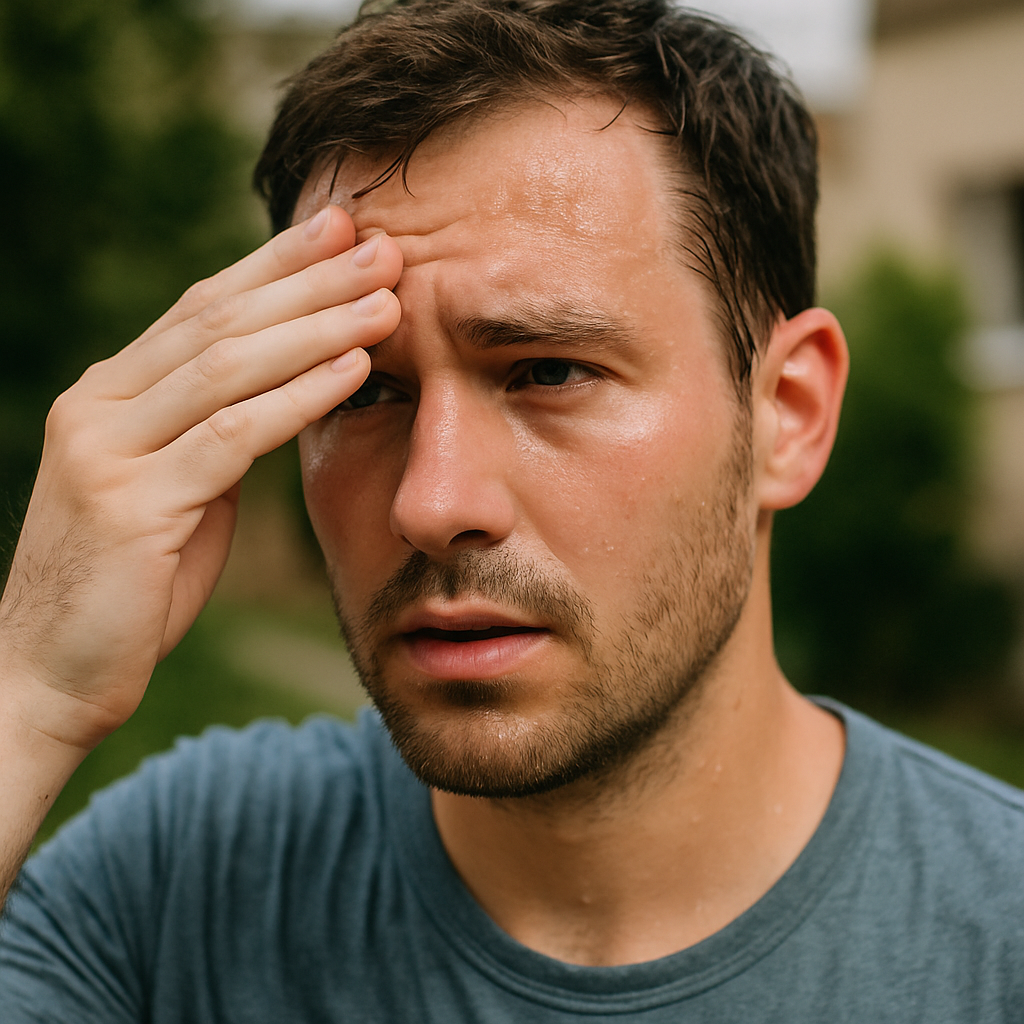आयुर्वेदिक डॉक्टर से प्रश्न पूछें और निःशुल्क या भुगतान मोड में अपनी चिंता की समस्या पर ऑनलाइन परामर्श प्राप्त करें। 2,000 से अधिक अनुभवी डॉक्टर हमारी साइट पर काम करते हैं और आपके प्रश्नों का इंतजार करते हैं और उपयोगकर्ताओं को उनकी स्वास्थ्य समस्याओं को हल करने में प्रतिदिन मदद करते हैं।
पसीने को कैसे नियंत्रित करें: ताज़गी बनाए रखने के प्राकृतिक तरीके

पसीना आना एक प्राकृतिक प्रक्रिया है जिससे हमारा शरीर ठंडा होता है, लेकिन कभी-कभी यह एक अनियंत्रित परेशानी की तरह महसूस होता है — खासकर जब यह अत्यधिक या असुविधाजनक समय पर होता है। अगर आप सोच रहे हैं पसीना कैसे नियंत्रित करें और व्यावहारिक, प्राकृतिक समाधान ढूंढ रहे हैं, तो आप सही जगह पर हैं। चाहे वह गर्मियों के दिनों में अत्यधिक पसीना कैसे नियंत्रित करें हो या चेहरे पर पसीना कैसे नियंत्रित करें या हथेलियों पर पसीना कैसे नियंत्रित करें, यह लेख आपको ताजगी और आत्मविश्वास से भरा महसूस कराने के लिए यथार्थवादी और प्रभावी तरीके बताता है। पसीने का नियंत्रण सिर्फ आराम के लिए नहीं है; यह आपके आत्म-सम्मान को बढ़ा सकता है और सामाजिक या पेशेवर सेटिंग्स में शर्मिंदगी से बचा सकता है।
तो, कभी-कभी पसीना क्यों हाथ से निकल जाता है? और इसके बारे में आप प्राकृतिक रूप से क्या कर सकते हैं बिना केवल स्प्रे या दवाओं पर निर्भर हुए? आइए जानें कि अत्यधिक पसीना क्यों होता है, फिर कुछ आसान, आयुर्वेदिक प्रेरित टिप्स पर चलते हैं ताकि आप अपने शरीर की कूलिंग सिस्टम पर नियंत्रण वापस पा सकें।

अत्यधिक पसीना क्यों होता है
इससे पहले कि हम पसीना कैसे नियंत्रित करें में कूदें, यह समझना महत्वपूर्ण है कि यह क्यों होता है। पसीना मुख्य रूप से शरीर की गर्मी और शारीरिक परिश्रम के प्रति प्रतिक्रिया है, लेकिन कई अन्य कारक सामान्य पसीने को अत्यधिक पसीने में बदल सकते हैं — जिसे चिकित्सा रूप से हाइपरहाइड्रोसिस कहा जाता है।
सबसे पहले, आपके शरीर की पसीने की ग्रंथियां स्वायत्त तंत्रिका तंत्र द्वारा नियंत्रित होती हैं, जिसका मतलब है कि आप कब पसीना आएगा, इसे आप सचेत रूप से तय नहीं कर सकते। लेकिन कभी-कभी यह सिस्टम थोड़ा अधिक सक्रिय हो जाता है, जिससे जरूरत से ज्यादा पसीना आता है। यह गर्मी, आर्द्रता, तनाव, या यहां तक कि कुछ खाद्य पदार्थों द्वारा ट्रिगर हो सकता है।
हार्मोनल परिवर्तन, जैसे कि युवावस्था, रजोनिवृत्ति, या गर्भावस्था के दौरान, भी पसीने के उत्पादन को बढ़ा देते हैं। और चिकित्सा स्थितियों को न भूलें जैसे थायरॉयड समस्याएं, संक्रमण, या मधुमेह — ये सभी पसीने के स्तर को प्रभावित कर सकते हैं। यहां तक कि चिंता और तनाव भी विशेष क्षेत्रों में अत्यधिक पसीने को ट्रिगर कर सकते हैं, जैसे कि हथेलियां या खोपड़ी।
अंत में, कुछ लोगों के पास स्वाभाविक रूप से अधिक पसीने की ग्रंथियां होती हैं या अधिक सक्रिय पसीने की ग्रंथियां होती हैं, जिससे वे दूसरों की तुलना में अधिक पसीना बहाते हैं — चाहे तापमान या गतिविधि स्तर कुछ भी हो।
इन ट्रिगर्स को समझना अत्यधिक पसीने को नियंत्रित करने के तरीके का पता लगाने में महत्वपूर्ण है क्योंकि आपका दृष्टिकोण कारण के आधार पर भिन्न हो सकता है।
स्वयं दवा न लें और प्रतीक्षा न करें। अभी डॉक्टर से चैट शुरू करें
पसीने को नियंत्रित करने के प्राकृतिक और आयुर्वेदिक तरीके
अगर आप कठोर रसायनों या आक्रामक उपचारों के बिना पसीने को कम करने के लिए कोमल, प्राकृतिक तरीकों की तलाश कर रहे हैं, तो आयुर्वेद और पारंपरिक उपचार कई समय-परीक्षित विकल्प प्रदान करते हैं। ये तरीके आपके शरीर की आंतरिक गर्मी को संतुलित करने और तंत्रिका तंत्र को शांत करने पर ध्यान केंद्रित करते हैं।
1. खूब पानी पिएं: यह उल्टा लग सकता है, लेकिन अच्छी तरह से हाइड्रेटेड रहना शरीर के तापमान को नियंत्रित करने और पसीने को कम करने में मदद करता है। जब आप निर्जलित होते हैं, तो आपका शरीर अधिक पसीना बहाकर इसकी भरपाई कर सकता है।
2. हर्बल चाय: सेज चाय पीने से, जिसमें प्राकृतिक कसैले गुण होते हैं, पसीने को नियंत्रित करने में मदद मिल सकती है। इसी तरह, ग्रीन टी या कैमोमाइल चाय तनाव-प्रेरित पसीने को कम करने में मदद करती है।
3. प्राकृतिक पाउडर का उपयोग करें: चंदन या टैल्क जैसे पाउडर (लेकिन हानिकारक रसायनों के बिना वाले चुनें) को पसीने वाले क्षेत्रों में लगाने से नमी को अवशोषित किया जा सकता है और त्वचा को सूखा रखा जा सकता है।
4. आहार में बदलाव: मसालेदार भोजन, कैफीन, और शराब से बचें, जो सभी पसीने की ग्रंथियों को ट्रिगर करते हैं। इसके बजाय, खीरा, तरबूज, और पुदीना जैसे ठंडक देने वाले खाद्य पदार्थों पर ध्यान दें।
5. विश्राम तकनीकों का अभ्यास करें: तनाव और चिंता पसीने को बढ़ा सकते हैं, खासकर चेहरे पर पसीना कैसे नियंत्रित करें और खोपड़ी पर पसीना कैसे नियंत्रित करें। ध्यान, योग, या गहरी सांस लेने के व्यायाम आपके तंत्रिका तंत्र की अधिक सक्रियता को कम कर सकते हैं।
यह दृष्टिकोण धीमा है लेकिन उन लोगों के लिए प्रभावी है जो बिना किसी साइड इफेक्ट के प्राकृतिक पसीना नियंत्रण रणनीति चाहते हैं।

शरीर के विशिष्ट क्षेत्रों में पसीने को कैसे नियंत्रित करें
कभी-कभी पसीना सामान्य रूप से नहीं होता है — यह आपके चेहरे, खोपड़ी, बगल, या हथेलियों जैसे विशिष्ट स्थानों पर केंद्रित हो सकता है। इन क्षेत्रों में पसीने को नियंत्रित करना आपके दैनिक आराम और आत्मविश्वास में बड़ा अंतर ला सकता है।
चेहरे और खोपड़ी पर पसीने को कैसे नियंत्रित करें
चेहरे और खोपड़ी पर पसीना विशेष रूप से मुश्किल हो सकता है क्योंकि ये क्षेत्र हमेशा दिखाई देते हैं, और पसीना आपकी त्वचा को तैलीय या आपके बालों को लंगड़ा बना सकता है। यहां कुछ टिप्स दिए गए हैं जो चीजों को नियंत्रण में रखने में मदद कर सकते हैं:
-
अपने चेहरे को साफ और सूखा रखें: अपने चेहरे को नियमित रूप से एक सौम्य क्लींजर से धोएं ताकि अतिरिक्त तेल और पसीना हट सके। भारी क्रीम से बचें जो छिद्रों को बंद कर सकते हैं और पसीने को और खराब कर सकते हैं।
-
मैटिफाइंग उत्पादों का उपयोग करें: हल्के, मैटिफाइंग लोशन या पाउडर जो तैलीय त्वचा के लिए डिज़ाइन किए गए हैं, चमक को कम कर सकते हैं और पसीने को अवशोषित कर सकते हैं। बस यह सुनिश्चित करें कि वे गैर-कॉमेडोजेनिक हों ताकि ब्रेकआउट से बचा जा सके।
-
प्राकृतिक कसैले: विच हेज़ल या गुलाब जल को कॉटन पैड के साथ लगाने से छिद्रों को कस सकता है और चेहरे पर पसीने को प्राकृतिक रूप से नियंत्रित कर सकता है।
-
खोपड़ी पर पसीने को नियंत्रित करें: चाय के पेड़ के तेल या मेंथॉल जैसे तत्वों वाले शैंपू का उपयोग करने का प्रयास करें जो खोपड़ी को ठंडा करते हैं और पसीने को कम करते हैं। भारी बाल उत्पादों से बचें जो गर्मी को फंसाते हैं।
-
शांत रहें और तनाव से बचें: चूंकि खोपड़ी पर पसीने को नियंत्रित करना अक्सर तनाव से जुड़ा होता है, माइंडफुलनेस या तनाव-घटाने वाले व्यायाम का अभ्यास करने से ध्यान देने योग्य अंतर आ सकता है।
बगल और हथेलियों में पसीने को कैसे नियंत्रित करें
बगल और हथेलियां क्लासिक पसीने वाले क्षेत्र हैं जिनसे कई लोग जूझते हैं। यहां बताया गया है कि इन जिद्दी क्षेत्रों को कैसे प्रबंधित करें:
-
सही एंटीपर्सपिरेंट चुनें: बगल के लिए, क्लिनिकल-स्ट्रेंथ एंटीपर्सपिरेंट्स का उपयोग करें जो अस्थायी रूप से पसीने की ग्रंथियों को ब्लॉक करते हैं। सर्वोत्तम परिणामों के लिए उन्हें रात में लगाएं।
-
सांस लेने योग्य कपड़े पहनें: कपास और नमी-विकिंग कपड़े हवा को प्रसारित करने में मदद करते हैं और पसीने के निर्माण को कम करते हैं।
-
हथेलियों को सूखा रखें: तनावपूर्ण या गर्म क्षणों के दौरान पसीने वाली हथेलियों को चुपचाप पोंछने के लिए एक छोटा तौलिया या शोषक कपड़ा साथ रखें।
-
प्राकृतिक उपचार आजमाएं: बेकिंग सोडा को पानी के साथ मिलाकर एक साधारण पेस्ट बनाएं जिसे बगल या हथेलियों पर लगाया जा सकता है ताकि गंध को बेअसर किया जा सके और नमी को अवशोषित किया जा सके।
-
बोटॉक्स इंजेक्शन: हथेलियों के अत्यधिक पसीने (हाइपरहाइड्रोसिस) के गंभीर मामलों के लिए, बोटॉक्स जैसी चिकित्सा उपचार पसीने का कारण बनने वाले तंत्रिका संकेतों को ब्लॉक कर सकते हैं — लेकिन हमेशा पहले प्राकृतिक तरीकों को आजमाना सबसे अच्छा होता है।
जब पसीना एक चिकित्सा चिंता बन जाता है
जबकि पसीना आना सामान्य है, कभी-कभी यह आरामदायक या स्वस्थ से परे चला जाता है। अगर आप बिना स्पष्ट कारणों के पसीने में भीग जाते हैं, या पसीना आपके दैनिक जीवन को बाधित करता है, तो यह चिकित्सा हाइपरहाइड्रोसिस का संकेत हो सकता है।
अन्य चेतावनी संकेतों पर ध्यान दें:
-
अचानक, अत्यधिक पसीना जो लंबे समय तक रहता है
-
शरीर के केवल एक हिस्से पर पसीना आना
-
पसीना बुखार, वजन घटाने, या सीने में दर्द के साथ हो
अगर आप इनमें से कोई अनुभव करते हैं, तो स्वास्थ्य सेवा प्रदाता से परामर्श करना महत्वपूर्ण है। वे उपचार जैसे कि प्रिस्क्रिप्शन एंटीपर्सपिरेंट्स, मौखिक दवाएं, या यहां तक कि चरम मामलों में सर्जरी की सिफारिश कर सकते हैं।
कई लोगों के लिए, गर्मियों में पसीना कैसे नियंत्रित करें या दैनिक गतिविधियों के दौरान सीखना चिकित्सा हस्तक्षेप की आवश्यकता को कम कर सकता है। हाइड्रेटेड रहना, तनाव प्रबंधन, और प्राकृतिक उपचारों का उपयोग करना बहुत मदद कर सकता है।
निष्कर्ष
पसीना आना एक प्राकृतिक और आवश्यक प्रक्रिया है, लेकिन पसीना कैसे नियंत्रित करें सीखना आपको पूरे दिन अधिक आरामदायक, आत्मविश्वासी और ताजा महसूस करने में मदद कर सकता है। चाहे आप चेहरे, खोपड़ी, बगल, या हथेलियों पर अत्यधिक पसीने से निपट रहे हों, कठोर रसायनों या महंगे उपचारों पर पूरी तरह से निर्भर हुए बिना नियंत्रण वापस लेने के लिए कई प्राकृतिक और प्रभावी तरीके हैं।
सरल जीवनशैली में बदलाव जैसे पर्याप्त पानी पीना और सही कपड़े चुनना, हर्बल उपचार और तनाव प्रबंधन तकनीकें आपके शरीर के तापमान को संतुलित करने और अत्यधिक पसीने की ग्रंथियों को कम करने में मदद करती हैं। याद रखें, अगर पसीना अत्यधिक हो जाता है या आपके जीवन में हस्तक्षेप करता है, तो आगे के उपचार विकल्पों का पता लगाने के लिए चिकित्सा पेशेवर से परामर्श करना हमेशा सबसे अच्छा होता है।
इन पसीना नियंत्रण युक्तियों को शामिल करके, आप उन पसीने वाले क्षणों को बेहतर तरीके से प्रबंधित कर सकते हैं और ठंडा रह सकते हैं — चाहे जीवन आपके सामने कुछ भी लाए।
तो अगली बार जब आप गर्मियों में पसीना कैसे नियंत्रित करें के बारे में सोचें या हथेलियों पर पसीना कैसे नियंत्रित करें से अभिभूत महसूस करें, तो पहले कुछ प्राकृतिक तरीकों को आजमाएं। आप यह देखकर आश्चर्यचकित हो सकते हैं कि वे कितनी मदद कर सकते हैं! और इन युक्तियों को उन दोस्तों या परिवार के साथ साझा करने में संकोच न करें जो इसी समस्या से जूझते हैं — क्योंकि किसी को भी पसीने के बारे में शर्मिंदा महसूस नहीं करना चाहिए, लेकिन हर किसी को आरामदायक महसूस करने का हक है।
अक्सर पूछे जाने वाले प्रश्न
कौन से खाद्य पदार्थ पसीना कम करते हैं?
कुछ खाद्य पदार्थ जैसे खीरा, तरबूज, पुदीना, और ग्रीन टी आपके शरीर को आंतरिक रूप से ठंडा करके पसीने को कम करने में मदद कर सकते हैं। मसालेदार भोजन, कैफीन, और शराब से बचें, क्योंकि वे पसीने के उत्पादन को बढ़ाते हैं।
क्या बगल के बाल शेव करने से पसीना कम होता है?
बगल के बाल शेव करने से सीधे पसीना कम नहीं होता, लेकिन यह गंध को कम करने में मदद कर सकता है क्योंकि बाल पसीना और बैक्टीरिया को फंसाते हैं। साथ ही, यह एंटीपर्सपिरेंट्स या पाउडर लगाने को आसान और अधिक प्रभावी बनाता है।
क्या खोपड़ी का पसीना तनाव से जुड़ा होता है?
हां, खोपड़ी का पसीना अक्सर तनाव या चिंता के साथ बढ़ जाता है क्योंकि यह तंत्रिका तंत्र को सक्रिय करता है। विश्राम तकनीकों के माध्यम से तनाव का प्रबंधन खोपड़ी पर पसीने को नियंत्रित करने में मदद कर सकता है।

